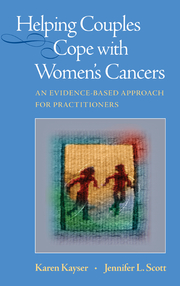Detailansicht
Helping Couples Cope with Women's Cancers
An Evidence-Based Approach for Practitioners
ISBN/EAN: 9781441945143
Umbreit-Nr.: 960720
Sprache:
Englisch
Umfang: xv, 229 S.
Format in cm:
Einband:
kartoniertes Buch
Erschienen am 04.11.2010
Auflage: 1/2008
- Zusatztext
- At last, here is a comprehensive guide for practitioners who work with breast cancer patients and their families. It includes a series of psychosocial interventions to be used with couples during early stage breast cancer. There is extensive evidence that emotional and social support positively influences women's abilities to cope to breast cancer. The first person that a woman with breast cancer turns to for support is her husband or intimate partner. However, as partners of breast cancer patients are struggling with their emotional distress, they often feel inadequate about their ability to help their wives and partners cope. It is important for practitioners to understand this concept of twofold stress.
- Kurztext
- Close relationships can be vital to a woman's recovery from breast or gynecological cancer and the myriad stressors that accompany diagnosis and treatment. Helping Couples Cope with Women's Cancer shows readers not only how to enlist the patient's closest support person in coping with the disease, but also to help that partner with the stressors, such as feelings of inadequacy and loss, that so often come with the role. The authors, established experts on their subject, recognize the challenges couples face, the central role of communication in coping, and the individuality of each patient and couple. In addition to proven intervention techniques and helpful assessment tools, the book features case illustrations, "What to do if." sections, sociocultural considerations, and suggestions for when the patient's caregiver is not her partner. Key areas of coverage include: Assessment: quality of life, impact of illness, family resources. Balancing work, family, selfcare, and the demands of illness. Cognitive coping, relaxation, stress reduction. Body image, sexuality, and intimacy. Helping children cope: developmental guidelines. Transitions: goalsetting, life after cancer, facing recurrence or terminal illness. The skills and insights contained in Helping Couples Cope with Women's Cancers will benefit a range of health and mental health practitioners, including counselors, social workers, clinical psychologists, psychiatrists, and nurses. Graduate students planning a career in health psychology or couples therapy should also find it a valuable resource.
